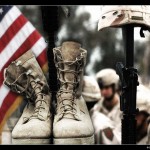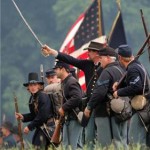I was at the mall last weekend and I made an observation.
Amidst the doorbusters and the 40-60% off clearance sales, I took a look around. I’m a “people watcher” by nature—always have been. So, I sized up each shopper that stood among the racks of clothes or in long lines for the register, and realized no one was smiling. Even the clerks were pretty subdued, except when they offered the routine “Happy Holidays. Have a nice day.” Oh, I could find any item of clothing I was looking for on a sales rack, but what I couldn’t seem to find was the actual joy of the season.
Seems a shame if you really think about it. I know how it happens. To-do lists are long, things need to be done and there never seems enough time to fit it all in. So, we rush and we stress, and that’s when the smiles disappear. I’ll admit, I used to be that way. That is until the Christmas of 2006.
You see, it’s not easy shopping for my father. He never really asks for anything, and my sister and I discovered not so long ago that most of the gifts we’ve given him have ended up in a drawer. He would much rather store them away than disappoint us with the fact that he wasn’t using them. Four years ago, I had a great idea. I decided to give him the gift of me helping others. Let me explain.
I got talking to Kris, a co-worker whose close friend Nick was serving in Iraq. We decided to put together care packages for him and the guys in his unit. My dad is a veteran and served in the Vietnam War. He once told me about a care package my mom sent him when he was overseas. Inside it, she put goodies from home, including two Jiffy Pop popcorn tins—you know, the kind with the handle attached that you make over a campfire? My dad told me that when he was hunkered down in a fox hole, he made that popcorn and told me how guys he didn’t even know very well seemed to appear out of nowhere just to get a handful. That little treat from home had turned out to mean so much.
Knowing that now, my co-workers, my mom and I went to work putting together care packages for Nick and the guys serving with him. We packed things like snacks, magazines, playing cards, chapstick, even a pair of Groucho Marx glasses so the guys could have a few laughs.
We planned on filling a couple boxes, but ended up with around a dozen. We shipped them off. Then, on Christmas morning, my dad found a letter under the Christmas tree explaining that, in his honor, we all had made an effort to send some holiday joy to Nick and his unit. My dad was very touched and said it was the best gift we could have given him. I thought: “This is what Christmas is all about.”
Kris heard from Nick a few weeks later. The guys loved the treats and all the gifts. He said the Groucho Marx glasses may have been the biggest hit of all. It felt good for us to know that while those soldiers were giving so much of themselves, we could so something small in comparison to let them know we here at home were grateful.
Less than three months later, while on combat patrol in Baghdad, an I.E.D. exploded near Nick’s unit. Nick was only one of two soldiers to survive the attack but he was badly hurt. He made it back to the states, but died at Walter Reed Army Medical Center.
I still think of Nick often, especially around Christmas. He not only served and died protecting our freedom, but he taught me a valuable lesson about the gift of giving and more importantly, the gift of time. Enjoy the people in your life. Value the season which brings us all together. No matter how long your to-do list, at the end of the day it’s not the “stuff” that matters. It’s the moments that made a difference in someone’s life.
I thank Nick for that even though I never had the honor of meeting him.
Kelli Warner,
KMTR-TV Morning News anchor
Springfield, OR



